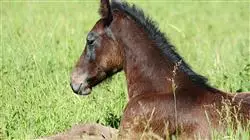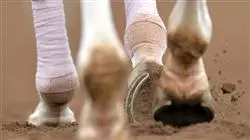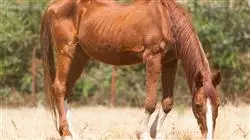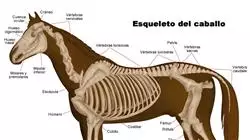University certificate
The world's largest faculty of veterinary medicine”
Description
A complete and fully updated postgraduate diploma in Locomotor Disorders in Foals and Adult Horses. Extended Therapeutic Protocols in Ambulatory Practice the most complete and effective training program in the online educational market"

In order to do a good job in the field, the professional must have a solid theoretical knowledge of anatomy, pathophysiology and therapeutics, which he/she already possesses through his/her higher academic training. However, university programs sometimes lack practical and extended training in locomotor pathologies; moreover, research on the subject is constantly advancing, with new techniques and procedures being introduced on a daily basis. Professionals take training courses and attend congresses on the subject, but it is essential for them to receive solid and proven quality accredited training. This postgraduate diploma is a comprehensive tool that will provide you with the necessary tools to be prepared to meet the demands of today's demanding job market.
The foal is very resistant to certain situations and exhibits enormous plasticity in the face of pathologies involving, for example, healing and revascularization processes. However, it is extremely delicate and sensitive to other alterations, especially in the post-partum period. Their hygienic-sanitary management is totally different from that of the adult horse, and the veterinarian must be very aware of this difference when performing his work; what works for one does not work for the other and vice versa.
The neonate, therefore, is especially delicate at the time of delivery and in the following days. The type of placenta that the mare has limits the immunity with which the foal is born, so in this species, it is especially important to control the neonatal period, especially during the first 24 hours of life, where colostrum intake and the arrival of immunoglobulins by intestinal absorption take place.
For the correct evaluation of the newborn it is essential to carry out a complete examination and monitoring scheme. A healthy neonate's behavior differs considerably from that of an adult, so it is important for the veterinarian to alert the owner to normal as well as abnormal attitudes, which should alarm him or her and may be indicative of disease. The veterinarian must have a global and extensive vision of the protocols for working with a neonate, and ensure that all its systems are functioning normally.
Join the elite, with this highly effective training and open new paths to your professional progress"
This postgraduate diploma in Locomotor Disorders in Foals and Adult Horses. Extended Therapeutic Protocols in Ambulatory Practice offers you the characteristics of a course of high scientific, teaching and technological level. These are some of its most notable features:
- Latest technology in online teaching software
- Highly visual teaching system, supported by graphic and schematic contents that are easy to assimilate and understand
- Practical cases presented by practising experts
- State-of-the-art interactive video systems
- Teaching supported by telepractice
- Continuous updating and recycling systems
- Self-regulating learning: full compatibility with other occupations
- Practical exercises for self-evaluation and learning verification
- Support groups and educational synergies: questions to the expert, debate and knowledge forums
- Communication with the teacher and individual reflection work
- Content that is accessible from any fixed or portable device with an Internet connection
- Banks of complementary documentation permanently available, even after the end of the training
A complete training program that will allow you to acquire the most advanced knowledge in all the areas of intervention of the equine veterinarian"
Our teaching staff is made up of professionals from different fields related to this specialty. In this way, we ensure that we provide you with the training update we are aiming for. A multidisciplinary team of professionals trained and experienced in different environments, who will develop the theoretical knowledge in an efficient way, but, above all, will put at your service the practical knowledge derived from their own experience: one of the differential qualities of this training.
The efficiency of the methodological design of this postgraduate diploma, enhances the student's understanding of the subject. Developed by a multidisciplinary team of e-learning experts, it integrates the latest advances in educational technology. This way, you will be able to study with a range of comfortable and versatile multimedia tools that will give you the operability you need in your training.
The design of this program is based on Problem-Based Learning: an approach that conceives learning as a highly practical process. To achieve this remotely, we will use telepractice: with the help of an innovative interactive video system, and learning from an expert, you will be able to acquire the knowledge as if you were actually dealing with the scenario you are learning about. A concept that will allow you to integrate and fix learning in a more realistic and permanent way.
With the experience of working professionals and the analysis of real cases of success, in a high-impact training approach"

With a methodological design based on proven teaching techniques, this innovative course will take you through different teaching approaches to allow you to learn in a dynamic and effective way"
Objectives
Our objective is to train highly qualified professionals for work experience. An objective that is complemented, moreover, in a global manner, by promoting human development that lays the foundations for a better society. This objective is materialized in helping professionals to reach a much higher level of competence and control. A goal that, in just a few months, you will be able to achieve with a high intensity and effective training.

If your objective is to redirect your capacity towards new paths of success and development, this is your Expert: a training that aspires to excellence"
General Objectives
- Identify the different anatomical structures and pathologies of the digestive tract of the horse
- Develop and advance in the most frequent procedures to solve oral cavity pathologies
- Recognize the symptoms of digestive disorders
- Enable the clinician to correctly assess the systemic state of the animal and the consequent severity of the pathology
- Establish diagnostic protocols and generate optimized treatments and prognoses
- Establish optimal preventive medicine criteria and good management guidelines
- Establish an appropriate methodology for the examination of the horse with respiratory or cardiac problems
- Identify all clinical signs associated with respiratory or cardiovascular disease in equines
- Generate specialized knowledge of respiratory and cardiac auscultation
- Establish the specific clinical approach to the horse with a respiratory or cardiovascular disorder
- Identify the pathologies of the urinary system of the horse
- Establish diagnostic protocols to facilitate the recognition of patients with urinary pathology
- Expand the alternatives of possible treatments according to pathological situations
- Recognize the medical and surgical genital pathologies of the stallion and the broodmare, assess their extent and provide appropriate treatments for recovery and restoration of proper reproductive function
- Develop surgical techniques for the resolution of pathologies of the reproductive system that can be performed in the field
Specific Objectives
Module 1. Locomotor System
- Identify in depth the pathologies that affect the horse's musculoskeletal system by types of pathologies of the different anatomical regions
- Master in depth the correct approach to the clinical case that may be presented. Obtain and control the tools for the correct exploration of the animal and a correct interpretation of the data obtained
- Develop optimized work schemes and diagnostic protocols
- Advanced diagnosis of joint, tendon, bone and muscle pathologies in horses
- Master in depth the neural anesthetic blocks, their technique, main advantages and possible disadvantages. Develop proximal blocks and other advanced anesthetic desensitization techniques
- Master and develop in depth imaging techniques and other complementary diagnostic methods in the field
- Receive training in the latest published therapeutic measures and the latest advances in research in the treatment of locomotor pathologies
- Master and develop advanced medical and surgical techniques that can be performed in the field
Module 2. Foal Medicine and Surgery
- Identify the neonatal patient with abnormal behaviors indicative of disease
- Establish lines of action for neonatal patients with sepsis, based on severity
- Determine work protocols for patients with symptoms of neonatal asphyxia syndrome
- Recognize the patient with cardio-respiratory symptomatology, being able to issue prognoses that determine their viability
- Develop field stabilization protocols for patients with bladder rupture or patent urachus
- Identify the difference in diagnostic test results between neonates and adults
- Determine the use of diagnostic imaging tools that can be used in the field to diagnose pathologies in the foal, both in the neonatal and pediatric period. Use these methods accurately to diagnose and assess the different pathologies that may occur in these stages
- Develop the techniques of examination, diagnosis and parenteral and local treatment by joint lavage of septic arthritis in the neonate
- Deploy techniques that could be performed in the field to solve surgical pathologies of the growing foal, such as umbilical hernia correction
- Compile knowledge of angular and flexural deformities of the foal. Develop their different treatments and establish the specificities of their treatment according to the age of the patient and the anatomical region affected
- Detail the medical treatments and application of resins, splints and orthopedic hardware used in the treatment of angular and flexural deformities
- Specify the techniques for delaying and stimulating bone growth used in the surgical treatment of angular deformities
- Determine the desmotomy and tenotomy techniques used in the treatment of flexural deformities
- Establish an appropriate methodology for the identification, treatment and prognostication of osteochondral injuries and subchondral bone cysts
Module 3. Advanced Therapeutic Protocol and Toxicology
- Analyze the new alternatives in terms of drugs used in sedation and anesthesia for outpatient use, as well as to deepen in the most established protocols in order to optimize this type of procedures
- Train the clinician in effective and dynamic decision making when dealing with a patient with a serious systemic condition, in order to ensure diagnoses and treatments that ensure patient stabilization despite non-hospital conditions
- Train the clinician in the correction of hydro-electrolyte and acid-base imbalances to ensure the reversal of hemodynamic alterations
- Ensure advanced knowledge of equine pain management with the latest medications
- Examine the characteristics and special considerations to be taken into account when applying pharmacological treatments in the sport horse, with special emphasis on avoiding problems in case of possible positive results in control tests for biological substances in competitions
- Generate advanced knowledge on equine toxicology, ensuring training for the recognition of toxic symptoms as well as the identification of plants and agents harmful to equines
- Analyze euthanasia procedures in depth. The clinician must be able to act correctly with patients in these last moments of their life trajectory, applying euthanasia in the most humane way possible in case of last necessity

A path to achieve specialization and professional growth that will propel you towards a greater level of competitiveness in the employment market"
Postgraduate Diploma in Locomotor Disorders in Foals and Adult Horses. Extended Therapeutic Protocols in Ambulatory Practice
Discover everything you need to know about locomotor disorders in foals and adult horses with our online Postgraduate Diploma in Locomotor Disorders. At TECH Technological University, we offer you the opportunity to acquire specialized knowledge in the care and treatment of these conditions in the equine area. Our Postgraduate Diploma in Locomotor Disorders in Foals and Adult Horses is designed for professionals and enthusiasts of the equine world who wish to understand in depth the most common locomotor conditions and develop extended therapeutic protocols for their approach. Through a theoretical and practical approach, you will explore the causes, diagnosis and treatment of these disorders, as well as the latest techniques and advances in the field.
Enroll now and start studying completely online
At TECH Technological University, we are proud to offer a high-quality online educational experience. Our program combines interactive online classes, multimedia resources and practical case studies that will allow you to acquire the necessary skills to efficiently identify and treat locomotor disorders in foals and adult horses. In addition, you will be supported by a team of expert professors who will guide you throughout the learning process. As a student of this Postgraduate Diploma, you will develop essential skills and competencies to perform an accurate diagnosis of locomotor disorders, design personalized therapeutic protocols and apply advanced treatment techniques. You will learn about the pathophysiology of these conditions, the different diagnostic imaging methods, as well as the therapeutic options available, such as physiotherapy, medication and surgery. Don't miss the opportunity to become an expert in locomotor disorders in foals and adult horses! Join TECH Technological University and broaden your knowledge in this vital field of equine veterinary medicine. Enroll today in our Postgraduate Diploma in Locomotor Disorders in Foals and Adult Horses!







